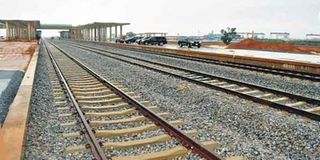Steel maker up in arms over imports for big projects

What you need to know:
- Local content requirements (LCRs) are policy measures that typically require a certain percentage of intermediate goods or skills to be sourced internally.
Arusha/Dar. A local steel producers has complained about the lack of local content in major projects executed by multinational companies.
Local content requirements (LCRs) are policy measures that typically require a certain percentage of intermediate goods or skills to be sourced internally.
Currently, there are concerns that the government has been executing multi-billion dollars projects, and at the same time allowing the importation of materials and services that are readily available locally.
A local steel manufacturer, Lodhia Group Ltd, said yesterday that the Turkish construction company currently building the standard gauge railway line, Yapi Merkez Insaat Ve Sanayi, recently imported several thousand tonnes of steel instead of purchasing the product locally.
This comes at a time when statistics released by the Tanzania Investment Centre (TIC) show that economic infrastructure projects attracted investments worth a total of $86.561 billion between 2007 and 2015.
This has prompted calls for project developers to be compelled by law to source a certain percentage of project inputs locally to ensure that Tanzanians benefit from implementation of the projects.
“The government must be firm and direct contractors to source materials locally as part of wider efforts to support local industries,” Lodhia Group managing director Sailesh Pandit said, adding that Yapi Merkez Insaat Ve Sanayi had imported the steel duty-free.
However, a source familiar with the matter told The Citizen yesterday that the Turkish firm imported over 5,000 tonnes of steel at a total cost of Sh12.1 billion and paid Sh6.7 billion in various taxes.
“It’s not true that tax on the consignment was waived. The company is not breaking any law by importing steel since all the relevant taxes are being paid,” he said.
Other sources say some companies undertaking mega projects preferred imported raw materials such as steel due to quality concerns.
Also, Section 6 (2) of the Value Added Tax Act empowers the Finance Minister to grant VAT exemption on government projects funded by non-concessional loans as the State seeks to fast-track the execution of priority projects such as water and infrastructure.
Mr Pandit said his firm had slashed production by 55 per cent because imports had flooded the domestic market.
“This is not only frustrating our efforts to create jobs, but is also contrary to President John Magufuli’s industrialisation agenda,” he said.
Industry, Trade and Marketing minister Charles Mwijage told Parliament earlier in the year that Tanzania had 25 steel factories with the capacity to produce 577,600 tonnes annually.




